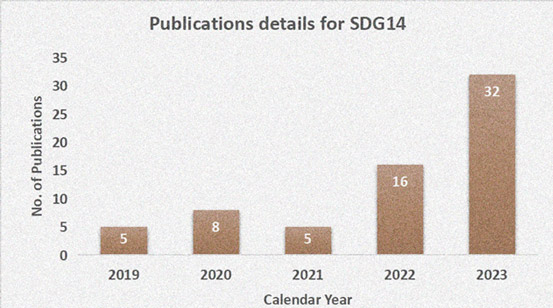
Research Initiatives
Research Publications: Lovely Professional University (LPU) has initiated an extensive research agenda to address critical environmental challenges, particularly focusing on aquatic ecosystems. Key research areas include the impact of plastics and microplastics on climate change, sustainable wastewater management, aquaculture advancements, and the remediation of toxic contamination in aquatic habitats. LPU's research also explores the potential of nanotechnology in aquaculture, the effects of antibiotic contamination in rivers, and innovative solutions for microplastic degradation. Through advanced studies in biotechnology, nanomaterials, and microbial applications, LPU aims to contribute to the sustainable management and protection of freshwater and marine ecosystems.
Research Publications: Lovely Professional University (LPU) has initiated an extensive research agenda to address critical environmental challenges, particularly focusing on aquatic ecosystems. Key research areas include the impact of plastics and microplastics on climate change, sustainable wastewater management, aquaculture advancements, and the remediation of toxic contamination in aquatic habitats. LPU's research also explores the potential of nanotechnology in aquaculture, the effects of antibiotic contamination in rivers, and innovative solutions for microplastic degradation. Through advanced studies in biotechnology, nanomaterials, and microbial applications, LPU aims to contribute to the sustainable management and protection of freshwater and marine ecosystems.
List of Research Publications for the year 2024
| Title | Authors |
|---|---|
| Exploring opportunities of Artificial Intelligence in aquaculture to meet increasing food demand | Ashraf Rather, M.| Ahmad, I.| Shah, A.| Ahmad Hajam, Y.| Amin, A.| Khursheed, S.| Ahmad, I.| Rasool, S. |
| Eco-friendly and safe alternatives for the valorization of shrimp farming waste | Wani, A.K.| Akhtar, N.| Mir, T.U.G.| Rahayu, F.| Suhara, C.| Anjli, A.| Chopra, C.| Singh, R.| Prakash, A.| El Messaoudi, N.| Fernandes, C.D.| Ferreira, L.F.R.| Rather, R.A.| Américo-Pinheiro, J.H.P. |
| Toxicological Research on Nano and Microplastics in Environmental Pollution: Current Advances and Future Directions | Shukla, S.| Pei, Y.| Li, W.-G.| Pei, D.-S. |
| Chitosan-based materials for heavy metal adsorption: Recent advancements, challenges and limitations | Ashraf, A.| Dutta, J.| Farooq, A.| Rafatullah, M.| Pal, K.| Kyzas, G.Z. |
| The Crucial Nexus of Microplastics on Ecosystem and Climate Change: Types, Source, Impacts, and Transport | Ratnasari, A.| Zainiyah, I.F.| Hadibarata, T.| Yan, L.Y.| Sharma, S.| Thakur, S.S. |
| Understanding the sources, fate and effects of microplastics in aquatic environments with a focus on risk profiling in aquaculture systems | Nabi, N.| Ahmad, I.| Amin, A.| Rather, M.A.| Ahmed, I.| Hajam, Y.A.| Khursheed, S.| Malik, M.M.| Abubakr, A. |
| Heavy metals toxicity in edible bivalves and risk exposure to humans through its consumption from Adyar Estuary, Tamilnadu, India – A baseline study | Chandrasekaran, T.S.| Milton, J.| Santhanabharathi, B.| Pradhoshini, K.P.| Cojandaraj, L.| Priyadharshini, M.| Ahmed, M.S.| Musthafa, M.S.| Balaji, P.| Faggio, C. |
| Biodegradability and bioavailability of dissolved substances in aquaculture effluent: Performance of indigenous bacteria, cyanobacteria, and green microalgae | Aranda-Vega, Y.| Bhatt, P.| Huang, J.-Y.| Brown, P.| Bhasin, A.| Hussain, A.S.| Simsek, H. |
| Spirulina platensis: A comprehensive review of its nutritional value, antioxidant activity and functional food potential | Sahil, S.| Bodh, S.| Verma, P. |
| Nanotechnology in aquaculture: Transforming the future of food security | Khan, S.K.| Dutta, J.| Ahmad, I.| Rather, M.A. |
| Microplastic pollution in surface sediments of Coromandel coastline, South-East Coast, India: Diversity index, carbonyl index, pollution load index, risk fraction and MPs inventory | Sahoo, M.M. |
| Green Intelligence: A Sequential CNN Odyssey in Mustard Leaf Disease Detection | Sakshi| Sharma, C.| Sharma, S.| Sharma, T.| Gochhait, S. |
| Dancing with danger-how honeybees are getting affected in the web of microplastics-a review | Bashir, S.| Ghosh, P.| Lal, P. |
| Assessment of Environmental Pollutants for Their Toxicological Effects of Human and Animal Health | Chaitanya, M.V.N.L.| Arora, S.| Pal, R.S.| Ali, H.S.| Haj, B.M.E.| Logesh, R. |
| Navigating the Complexity of Emerging Contaminants: Sources, Impacts, and Remediation Strategies | Singh, S.| Sivaram, N.| Dhanjal, D.S.| Assefa, H.| Singh, J.| Ramamurthy, P.C. |
| Environmental threats posed by xenobiotics | Sharma, K.| Kumar, P. |
| IoT Intervention in the monitoring of aquaponics metrics and control of input schedule | Malik, P.| Malik, P.K.| Ranjith Kumar, G.| Bali, J.S.| Mahajan, A.| Muhsen Hassan, M. |
| Investigation of micropolar dusty fluid flow in a rotational frame with magnetic field: A meshless radial basis function pseudospectral approach | Himanshu| Bhatia, G.S.| Chandrawat, R.K. |
| Advanced Nanofiltration Techniques for Efficient Removal of Microplastics from Water: A Review | Alekhya, V.| Swathi, B.| Kumar, A.| Kumar, A.| Jayronia, S.| Abood, A.S. |
| Waste Management as an Opportunity for the Inclusion of Vulnerable Groups | Devi, P.| Dey, S.R.| Sharma, K.| Kumar, P.| Singh, J. |
| Numerical model study on stability of a micro-tidal inlet at Muttukadu along the east coast of Bay of Bengal | Ayyappan, K.| Thiruvenkatasamy, K.| Balu, R.| Devendrapandi, G.| Kadaikunnan, S.| Ayyamperumal, R. |
| Sustainable use of Marine Resources using Ocean Technologies | Kumar, P.| Jose Anand, A.| Rajagopal, A.R. |
| Integrating IoT and Machine Learning for Smart Irrigation Systems in Agriculture | Keerthi, M.M.| Pranavan, S.| Satheesh Kumar, S.| Veena, C.H.| Manjunatha| Singla, A. |
| Combating the Effects of Climate Change through Regenerative Organic Agriculture | Begam, A.| Paramanik, B.| Dutta, S.| Dutta, G.| Bhattacharjee, S. |
| Therapeutic potential of natural compounds for treatment of chronic obstructive pulmonary disease: Current status and future perspective | Sahu, S.K.| Rain, M.M.| Vyas, M. |
| Oil Spills- Where We Were, Where We Are, And Where We Will Be? A Bibliometric and Content Analysis Discourse | Chandel, A.| Bhanot, N.| Gupta, S.| Verma, R. |
| Bacillus subtilis and Saccharomyces cerevisiae as Potential Modulators of Hemato-Biochemical Indices, Digestive Enzymes and Disease Resistance in Labeo rohita | Baisakhi, B.| Swain, H.S.| Bera, A.K.| Das, B.K.| Singh, R.| Upadhyay, A.| Mohanty, D. |
| Biochar production from marine algae and its application in the treatment of industrial effluent | Kumar, P. |
| Algae-based biorefineries for animal feed and aquaculture applications | Kaur, S.| Singh, R. |
| Plastisphere: Marine Microbial Assemblages for Biodegradation of Microplastics | Wani, A.K.| Naqash, N.| Akhtar, N.| Mir, T.U.G.| Mir, B.A.| Singh, R. |
| Enabling Transparent Supply to Build a Next-Generation Supply Chain | Channi, H.K.| Sandhu, R.| Kumar, P. |
| Climate Resilience of Coastal Cities Using Geographic Information Systems (GIS) | Lunyakov, M.| Ali, H.M.| Subbarayudu, Y.| Ghumman, S.| Bisht, M.S.| Mittal, A.| Sharma, R.| Tiwari, D.K.| Prashanthi, Bh. |
Patents: Researchers at Lovely Professional University (LPU) have demonstrated a strong commitment to addressing critical challenges related to Sustainable Development Goal 14 (SDG 14) by focusing on innovative solutions for aquatic ecosystems and marine pollution issues. Their work includes developing improved methods for wastewater treatment, enabling the efficient utilization of wastewater, and recycling of waste plastics. Following is the list of patents for 2024:
| Patent Application No | Title of the Patent |
|---|---|
| IN202411010510 | Water quality assessment and system thereof |
| IN202411033853 | Waste management system and method to operate the same |
| IN202411083136 | A method for identifying and selecting plant and marine sources with potential bioactive compounds |
| IN202411084555 | Smart water storage tank for continuous quality monitoring and algae detection |
| IN202411085410 | Method and system for assessing heavy metal contamination in aquatic ecosystems using clarias batrachus as a bioindicator |
| IN202411086362 | Method for catalytic degradation of pesticides from agricultural aquatic waste |
| IN202411089790 | Portable dual function hydroponic and aquaponic agriculture system |
| IN202411089867 | Smart rainwater management system with automated overflow alerts |
Toxic discharge from industrial processes significantly contributes to marine biodiversity and aquatic ecosystem pollution. Lovely Professional University (LPU) has recognized this issue and has actively contributed to mitigating its impact. LPU's efforts are notably directed towards reducing contaminants in textile industry effluent and developing effective treatment methods. LPU plays a crucial role in safeguarding marine biodiversity and aquatic ecosystems by addressing the pollution issues associated with the textile industry.
| Name of the Funding agency | Title of the Project |
| ISRO | Assessment of fluoride contamination in groundwater in Punjab using GIS and machine learning techniques. |
| Nikom chemicals | Identification of contaminants in textile industry effluent and their treatment methods |
technology and bioengineering. These publications reflect LPU's commitment to advancing knowledge and addressing critical environmental challenges. The books encompass a diverse range of topics, from the intricate polyandrous mating system of Queen Honey Bees, shedding light on their unique reproductive biology, to exploring the vital relationship between microbes and the environment, which is crucial for providing sustainable ecosystem services. Additionally, LPU's faculty delves into the profound impact of changing climates on the human microbiome, providing insights into the intricate interactions between microbes and their hosts. Book Chapters: LPU researchers explore the technologies for waste water treatment to prevent and maintain the existing Aquatic ecosystem
| Title of the book | Author Detail | ISBN/ISSN number of the proceeding |
|---|---|---|
| Integrated Environmental Technologies for Wastewater Treatment and Sustainable Development | Manpreet Kaur, Mukesh Kumar, Rohan Samir Kumar Sachan, Inderpal Devgon, Dr. Arun Karnwal | 978-0-323-91180-1 |
| Development in Wastewater Treatment Research and Processes | Neha Singh, Dr. Umesh Goutam | 978-0-323-85839-7 |
| Pesticides Remediation Technologies from Water and Wastewater | Abdul Basit Wani, Daljeet Singh Dhanjal, Dr. Joginder Singh Panwar | 978-0-323-90893-1 |
| Additive Manufacturing for Plastic Recycling: Efforts in Boosting a Circular Economy | Rupinder Singh, Ranvijay Kumar | 9781003184164 |
Lovely Professional University (LPU) has been actively involved in addressing challenges related to aquatic ecosystem conservation and sustainable water management in the rural areas of Punjab. These contributions reflect LPU's commitment to environmental sustainability and the preservation of vital aquatic ecosystems.
Following is the list of consultancy projects
| Title of project | Organization/Agency |
|---|---|
| Low-cost rainwater harvesting system design and installation in the govt. building of rural Punjab | Punjab department of rural development and panchayats |
| Renovation and construction of ponds for water conservation as a part of integrated watershed management in villages | Punjab department of rural development and panchayats |
| Low-cost rainwater harvesting system design and installation in the primary school of rural Punjab | Punjab department of rural development and panchayats |
| Design and fabrication of rainwater collection and purification system | Punjab department of rural development and panchayats |
| Design of water softening plant and installation for commercial use | Nikom chemicals |
| SUSTAINABLE UTILISATION OF SHREDDED PLASTIC FILE FOLDERS WASTE | PYRAMID E SERVICES |
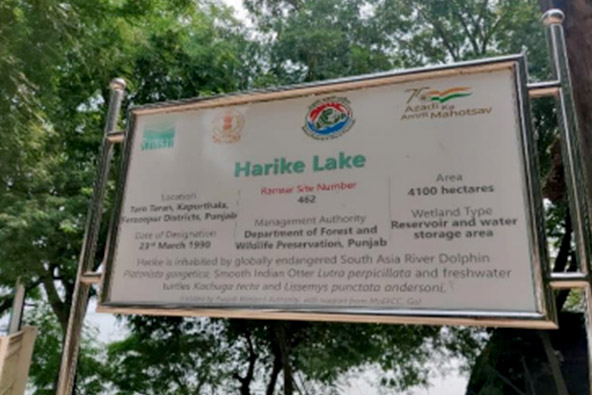
Link to the Harike Wetland Research Project: Click here
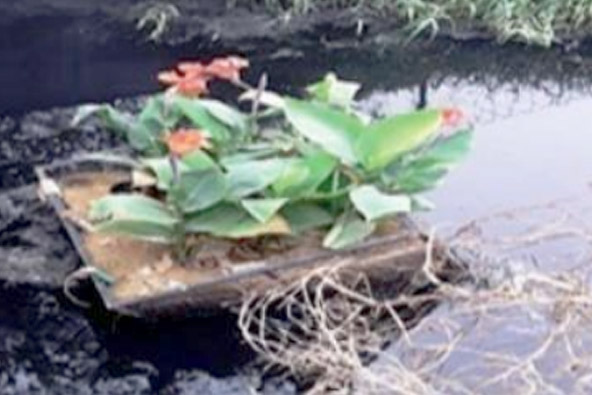
Regeneration of Wetland under research project
Wetland development is an important research field to maintain life sustainability in water and surrounding. With large level of urbanization, human disturbances have resulted in reduction and vanishing of wetlands. Since wetlands support both aquatic and terrestrial organisms, hence their sustenance is of major importance. LPU researchers and PhD Scholars are working on renewal of wetlands by utilizing specially developed biological/non-biological matrix for growing specially adapted plants (hydrophytes) and renew the characteristic of wetland (hydric)soils.
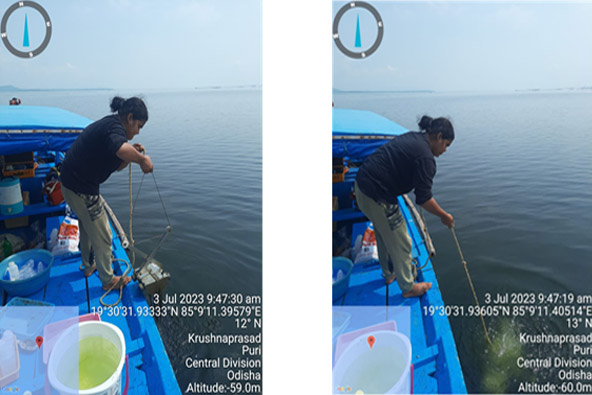
Research work on Meiofauna presence in marine sediments
About the Research: LPU Research scholar is working on Thrust area “Spatial and Seasonal variation of Polychaete along the Macrophytic and Non-Macrophytic area of Chilika Lagoon, India”. In this research, samples were collected from the Gulf of Kachchh during three different seasons. Through analyzing meiofaunal communities in these diverse conditions, study aims to assess sediment quality and identify potential impacts of pollution and climate change. These sediment samples have been carefully processed in the laboratory to extract and identify the polychaetes present. The collected data would then be analyzed to determine the spatial and seasonal patterns of polychaete distribution. The results may contribute to our understanding of the overall biodiversity and ecosystem dynamics of the Chilika Lagoon, as well as provide valuable information for its conservation and management
About the Research: LPU Research scholar is working on Thrust area “Spatial and Seasonal variation of Polychaete along the Macrophytic and Non-Macrophytic area of Chilika Lagoon, India”. In this research, samples were collected from the Gulf of Kachchh during three different seasons. Through analyzing meiofaunal communities in these diverse conditions, study aims to assess sediment quality and identify potential impacts of pollution and climate change. These sediment samples have been carefully processed in the laboratory to extract and identify the polychaetes present. The collected data would then be analyzed to determine the spatial and seasonal patterns of polychaete distribution. The results may contribute to our understanding of the overall biodiversity and ecosystem dynamics of the Chilika Lagoon, as well as provide valuable information for its conservation and management
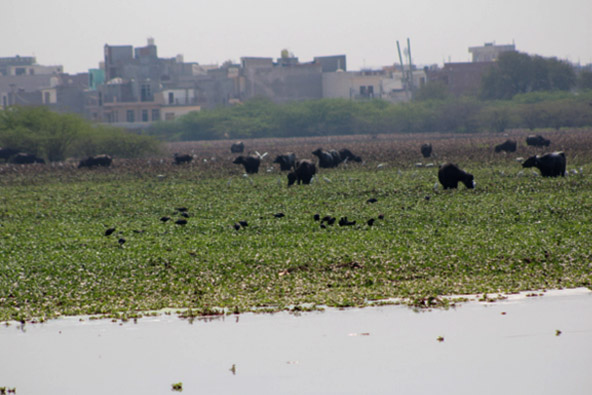
Disappearing Wetland: A Study of Basai Wetlands, Haryana (India)
Basai wetlands, located in Gurgaon city in Gurugram district of Haryana, India has been experiencing rapid shrinkage in its area over recent years due to continuous encroachment resulting from ever expanding city. The research, based on secondary data, examines the importance, threats and challenges faced by the wetland along with presenting a comparison between Basai and Sultanpur wetlands, which are located close to each other but in terms of conservation efforts display wide disparities. The paper highlights the extent of damage suffered by Basai wetlands on account of government and public apathy. Link to the study of Basai Wetland : Click here
Basai wetlands, located in Gurgaon city in Gurugram district of Haryana, India has been experiencing rapid shrinkage in its area over recent years due to continuous encroachment resulting from ever expanding city. The research, based on secondary data, examines the importance, threats and challenges faced by the wetland along with presenting a comparison between Basai and Sultanpur wetlands, which are located close to each other but in terms of conservation efforts display wide disparities. The paper highlights the extent of damage suffered by Basai wetlands on account of government and public apathy. Link to the study of Basai Wetland : Click here
| Sr. No. | Detail activities on the study of Wetlands |
| 1 | Devi, Moirangthem Roshni, and Ripudaman Singh. "anthropogenic impacts on a wetland: a case study of loktak lake." |
| 2 | Namgyel, Ugyen, and Ripudaman Singh. "Identifying Threats and Public Attitude towards Wetland Conservation: Case of Bumdeling Ramsar Site, Bhutan.", International Journal of All Research Education and Scientific Methods (IJARESM), ISSN: 2455-6211 Volume 9, Issue 4, April -2021 |
| 3 | Siraj Yousuf Parray, Bhupendra Koul, Maulin P. Shah, Comparative assessment of dominant macrophytes and limnological parameters of Dal Lake and Chatlam wetlands in the Union territory of Jammu & Kashmir, India, Environmental Technology & Innovation Volume 24, November 2021, 101978 |
| 4 | Ankanksha, Dr. Anand Kumar, Utkal Historical Research Journal, ISSN: 0976-2132 Vol.-34(I), 2021 |
| 5 | Shaista Manzoor, Harpreet Kaur and Rahul Singh, Existence of Microplastic as Pollutant In Harike Wetland: an Analysis of Plastic Composition and First Report on Ramsar Wetland of India, Current World Environment, ISSN: 0973-4929, Vol. 16, No. (1) 2021, Pg. 123-133 |
| 6 | Vipin Solanki, Ankanksha, Ramsar Wetlands of India- importance and conservation, NIU International Journal of Human Rights ISSN: 2394 – 0298 Volume 8(XVIII), 2021 |



